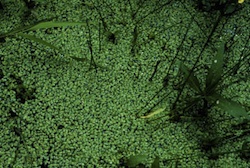Duckweed may be a viable material for biofuel production according to a new report in ACS’ journal Industrial and Engineering Chemistry Research. Duckweed is a fast growing floating plant that turns ponds and lakes green.
 Christodoulos A. Floudas, a professor at Princeton and Xin Xiao with Langfang Engineering and Technology Centre, Institute of Process Engineering, Chinese Academy of Sciences, along with several colleagues explain that duckweed, an aquatic plant that floats on or near the surface of still or slow-moving freshwater, is ideal as a raw material for biofuel production. It grows fast, thrives in wastewater that has no other use, does not impact the food supply and can be harvested more easily than algae and other aquatic plants. However, they say, few studies have been done on the use of duckweed as a raw material for biofuel production.
Christodoulos A. Floudas, a professor at Princeton and Xin Xiao with Langfang Engineering and Technology Centre, Institute of Process Engineering, Chinese Academy of Sciences, along with several colleagues explain that duckweed, an aquatic plant that floats on or near the surface of still or slow-moving freshwater, is ideal as a raw material for biofuel production. It grows fast, thrives in wastewater that has no other use, does not impact the food supply and can be harvested more easily than algae and other aquatic plants. However, they say, few studies have been done on the use of duckweed as a raw material for biofuel production.
In the article, Floudas and Xiao describe four scenarios for duckweed refineries that use proven existing technology to produce gasoline, diesel and kerosene. Those technologies include conversion of biomass to a gas; conversion of the gas to methanol, or wood alcohol; and conversion of methanol to gasoline and other fuels. The results show that small-scale duckweed refineries could produce cost-competitive fuel when the price of oil reaches $100 per barrel. Oil would have to cost only about $72 per barrel for larger duckweed refiners to be cost-competitive.
The research was partially funded from grants from the National Science Foundation and the Chinese Academy of Sciences.

